初中英语语法--形容词和副词
初中英语语法——形容词、副词
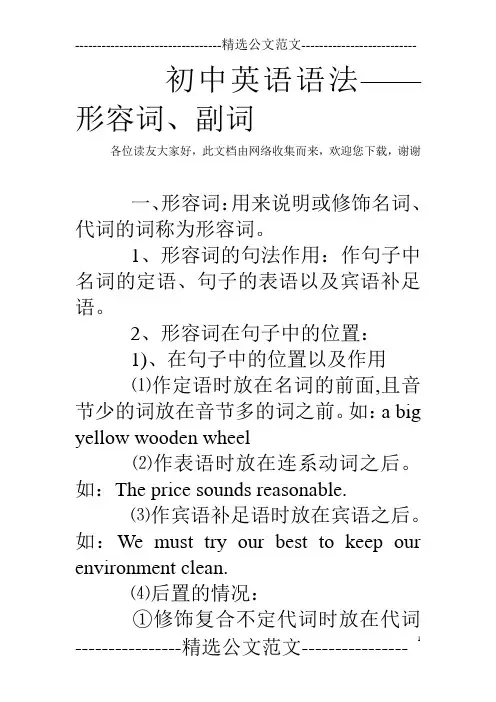
初中英语语法——形容词、副词各位读友大家好,此文档由网络收集而来,欢迎您下载,谢谢一、形容词:用来说明或修饰名词、代词的词称为形容词。
1、形容词的句法作用:作句子中名词的定语、句子的表语以及宾语补足语。
2、形容词在句子中的位置:1)、在句子中的位置以及作用⑴作定语时放在名词的前面,且音节少的词放在音节多的词之前。
如:a big yellow wooden wheel⑵作表语时放在连系动词之后。
如:The price sounds reasonable.⑶作宾语补足语时放在宾语之后。
如:We must try our best to keep our environment clean.⑷后置的情况:①修饰复合不定代词时放在代词之后。
如:Something serious has happened tohim.②与表示“长、宽、高、重、老、远离”的词连用时形容词后置。
如:He’s metres moon is about 380,000 kilometres away from the earth.2) 、多个形容词修饰同一个名词的顺序:代词数词性状形容词冠词前的形容词冠词指示代词不定代词代词所有格序数词基数词性质状态大小长短形状新旧温度颜色国籍产地材料质地名词all both such theathis another your second next one four good poorlargeshortsquarenewcoolblackyellowChineseLondonsilkstone二、副词1、副词:用来说明事情发生的时间、地点、原因、方式等含义或说明其它形容词或副词程度的词叫做副词。
2、副词的分类:1时间副词soon, now, early, finally, once, recently2地点副词here, nearby, outside, upwards, above3方式副词hard, well, fast, slowly, excitedly, really4程度副词almost, nearly, very, fairly, quite, rather5频度副词always, often, frequently, seldom, never6疑问副词how, where, when, why7连接副词how, when, where, why, whether, however, meanwhile8关系副词when, where, why3、副词在句子中的位置以及作用:作状语1.时间副词:一般放在句首或句尾,注意,early、late、before、later、yet等一般放在句尾,already、just一般放在动词的前面。
初中英语语法——形容词和副词-精(共18张)ppt课件

作定语,放在名词之前,不定代词之后
完整最新ppt
4
n ...的人 -al 有...属性的
-ful ...的
-y 充满...的,多...的 -ern ...方位的 -less 无...的
完整最新ppt
-en ...材质的 -able 可能的,可以的
5
副词是一种用来修饰动词,形容 词,副词或全句的词,说明时间,地点, 程度,方式等概念。
比较级
more slowly more quickly more angrily more softly more noisily
最高级
most slowly most quickly most angrily most softly most noisily
由ing分词和ed分词演变过来的形容词(包括不规 则动词如know→known)只能加more或most来表
more更多的;更
less更少的 farther更远的;更远地
further进一步的(地)
most最多的;最
least最少的 farthest最远的;最远地
furthest最深刻的(地)
完整最新ppt
15
①表示两者进行比较时用形容词比较级,其结构为“A…+比较级+ than+B”。 ②有表示程度的副词a little, a bit, a few, a lot, much, even, still, far, rather, any等修饰时,用形容词比较级。 ③表示两者之间进行选择“哪一个更……”时,用句型“Which/ Who is +形容词比较级,A or B?”表示。 ④表示“几倍于……”时,用“倍数+ 比较级+ than”表示。 ⑤表示“两者之间最……一个(of the two)”时,常用“the+比较级”结构。 ⑥表示“越来越……”,用比较级重叠结构,即“比较级+ and +比较级”,多音节词和部分双音节词时用“more and more +形容词原级” ⑦表示“越……就越……”时,用“the+比较级,the+比较级”结构。 ⑧在两者进行比较“表示A不如B”时,部分双音节和多音节副词除使用“not…as/ so +副词原级+as”结构外, 还可使用“less +副词原级+than”结构。 ⑨副词最高级前一般不加定冠词the。
初中英语语法之形容词,副词
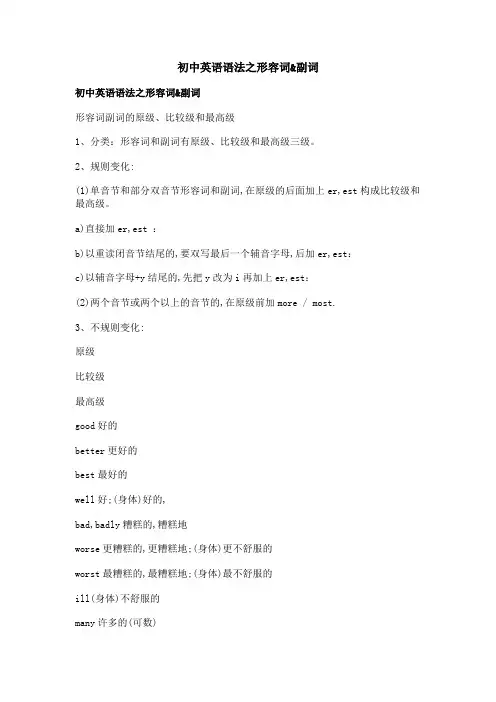
初中英语语法之形容词&副词初中英语语法之形容词&副词形容词副词的原级、比较级和最高级1、分类:形容词和副词有原级、比较级和最高级三级。
2、规则变化:(1)单音节和部分双音节形容词和副词,在原级的后面加上er,est构成比较级和最高级。
a)直接加er,est :b)以重读闭音节结尾的,要双写最后一个辅音字母,后加er,est:c)以辅音字母+y结尾的,先把y改为i再加上er,est:(2)两个音节或两个以上的音节的,在原级前加more / most.3、不规则变化:原级比较级最高级good好的better更好的best最好的well好;(身体)好的,bad,badly糟糕的,糟糕地worse更糟糕的,更糟糕地;(身体)更不舒服的worst最糟糕的,最糟糕地;(身体)最不舒服的ill(身体)不舒服的many许多的(可数)more更多的;更most最多的;最much许多的(不可数);非常little少的less更少的least最少的far远的;远地farther更远的;更远地farthest最远的;最远地further进一步的(地)furthest最深刻的(地)4、形容词和副词的原级、比较级和最高级的用法:(1) 讲述某人/物自身的情况时,用原级。
基本句型是:主语(sb./sth) + 谓语动词+(very/too/so/quite/rather…) + 形容词/副词原级+….如:He is very oldnow. 他现在很老了。
They ran quitefast. 它们跑得相当快。
The weatherlooks rather bad. 天气看上去相当糟。
I am sohappy! 我是如此的快乐!☆表示两者之间没有差别时,使用句型:主语(第一个人物) + 谓语动词 + as + 形容词/副词原级 + as + 第二个人物+….如He is as excited as his younger sister. 他和他妹妹一样兴奋。
初中英语语法---形容词和副词含练习
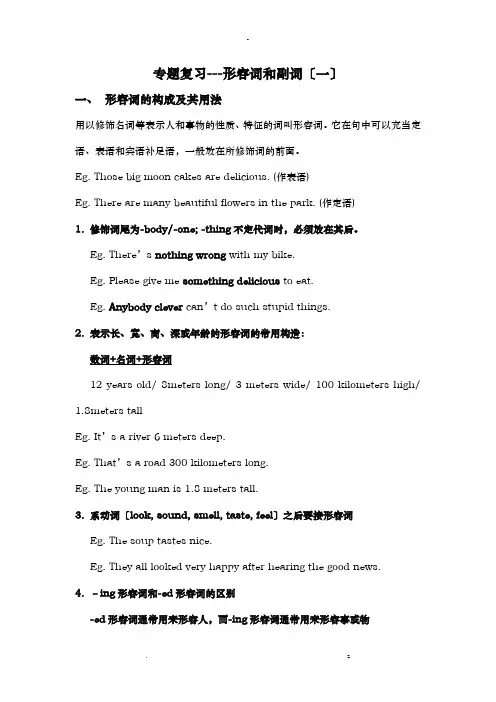
专题复习---形容词和副词〔一〕一、形容词的构成及其用法用以修饰名词等表示人和事物的性质、特征的词叫形容词。
它在句中可以充当定语、表语和宾语补足语,一般放在所修饰词的前面。
Eg. Those big moon cakes are delicious. (作表语)Eg. There are many beautiful flowers in the park. (作定语)1.修饰词尾为-body/-one; -thing不定代词时,必须放在其后。
Eg. There’s nothing wrong with my bike.Eg. Please give me something delicious to eat.Eg. Anybody clever can’t do such stupid things.2.表示长、宽、高、深或年龄的形容词的常用构造:数词+名词+形容词12 years old/ 8meters long/ 3 meters wide/ 100 kilometers high/ 1.8meters tallEg. It’s a river 6 meters deep.Eg. That’s a road 300 kilometers long.Eg. The young man is 1.8 meters tall.3.系动词〔look, sound, smell, taste, feel〕之后要接形容词Eg. The soup tastes nice.Eg. They all looked very happy after hearing the good news.4.–ing形容词和-ed形容词的区别-ed形容词通常用来形容人,而-ing形容词通常用来形容事或物如:disappointed/e*cited/interested/surprised/bored/amazed/rela*ed (*人)感到失望/兴奋/有趣/奇怪/厌烦/震惊/放松disappointing/e*citing/interesting/surprising/boring/amazing /rela*ing〔*事〕令人失望的/兴奋的/有趣的/奇怪的/厌烦的/震惊的/放松的5.“the +局部形容词〞表示“一类人〞the young the old the rich the poor二、副词的构成和用法。
初中英语语法与词汇(形容词,副词)
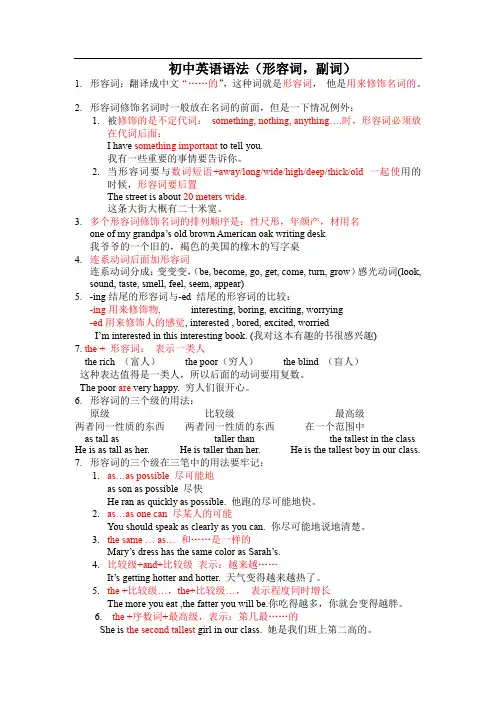
初中英语语法(形容词,副词)1.形容词:翻译成中文“……的”,这种词就是形容词,他是用来修饰名词的。
2.形容词修饰名词时一般放在名词的前面,但是一下情况例外:1.被修饰的是不定代词:something, nothing, anything….时,形容词必须放在代词后面:I have something important to tell you.我有一些重要的事情要告诉你。
2.当形容词要与数词短语+away/long/wide/high/deep/thick/old 一起使用的时候,形容词要后置The street is about 20 meters wide.这条大街大概有二十米宽。
3.多个形容词修饰名词的排列顺序是:性尺形,年颜产,材用名one of my grandpa’s old brown American oak writing desk我爷爷的一个旧的,褐色的美国的橡木的写字桌4.连系动词后面加形容词连系动词分成:变变变,(be, become, go, get, come, turn, grow)感光动词(look, sound, taste, smell, feel, seem, appear)5.-ing结尾的形容词与-ed 结尾的形容词的比较:-ing用来修饰物,interesting, boring, exciting, worrying-ed用来修饰人的感觉, interested , bored, excited, worriedI’m interested in this interesting book. (我对这本有趣的书很感兴趣)7. the + 形容词:表示一类人the rich (富人)the poor(穷人)the blind (盲人)这种表达值得是一类人,所以后面的动词要用复数。
The poor are very happy. 穷人们很开心。
6.形容词的三个级的用法:原级比较级最高级两者同一性质的东西两者同一性质的东西在一个范围中as tall as taller than the tallest in the class He is as tall as her. He is taller than her. He is the tallest boy in our class.7.形容词的三个级在三笔中的用法要牢记:1.as…as possible 尽可能地as son as possible 尽快He ran as quickly as possible. 他跑的尽可能地快。
形容词和副词的比较级和最高级
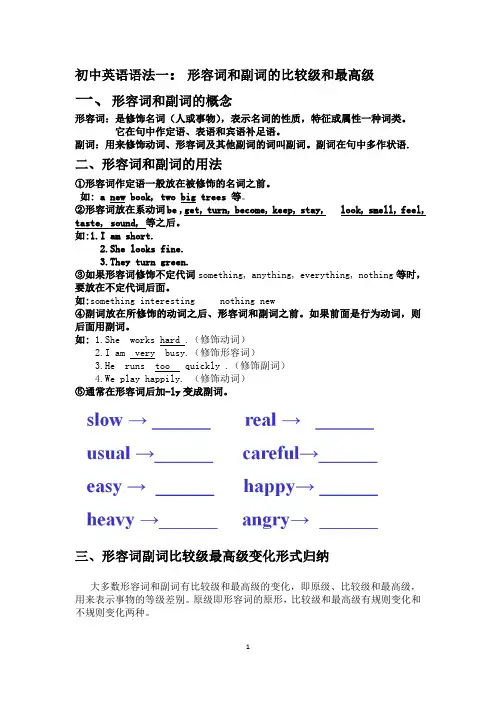
初中英语语法一:形容词和副词的比较级和最高级一、形容词和副词的概念形容词:是修饰名词(人或事物),表示名词的性质,特征或属性一种词类。
它在句中作定语、表语和宾语补足语。
副词:用来修饰动词、形容词及其他副词的词叫副词。
副词在句中多作状语.二、形容词和副词的用法①形容词作定语一般放在被修饰的名词之前。
如: a new book, two big trees等。
②形容词放在系动词be ,get, turn, become, keep, stay, look, smell, feel, taste, sound, 等之后。
如:1.I am short.2.She looks fine.3.They turn green.③如果形容词修饰不定代词something, anything, everything, nothing等时,要放在不定代词后面。
如:something interesting nothing new④副词放在所修饰的动词之后、形容词和副词之前。
如果前面是行为动词,则后面用副词。
如: 1.She works hard .(修饰动词)2.I am very busy.(修饰形容词)3.He runs too quickly .(修饰副词)4.We play happily. (修饰动词)⑤通常在形容词后加-ly变成副词。
三、形容词副词比较级最高级变化形式归纳大多数形容词和副词有比较级和最高级的变化,即原级、比较级和最高级,用来表示事物的等级差别。
原级即形容词的原形,比较级和最高级有规则变化和不规则变化两种。
1.规则变化1.单音节以及少数双音节的词后面直接加-er 或 -est特别提醒:以-y,-er, -ow, le结尾的双音节形容词末尾加er和est。
如:healthy, funny, busy, hungry, easy, happy, early, pretty, lazy, heavy, dirty, clever, narrow等。
初中英语语法——形容词副词
A living language should be learned orally(口头上). (活的语言应该从口头上学)(被动句) We have a living hope that you will succeed. (我们强烈地希望你能成功) Is she still alive? (她还活着吗?) They are the happiest children alive. (他们是活着的最开心的孩子)
⒀ gone、lost与missing
gone表示“丢了,没了”,含一去不复返 的意思,也可以表示“死了”,作表语或 宾补,不可以作定语; lost表示“丢失”,含难以找回的意思, 可作定语、表语或宾补; missing表示“失踪了,不见了”,强调 某人物不在原处,可作定语、表语或宾补。
My fever(高烧) is gone, but I still have a cough. (发烧消退了,但我仍然咳嗽) The parents found the lost child at last. (家长终于找到了迷路的孩子) My dictionary is missing.Who’s taken it away? (我的字典不见了,谁拿走了?) For more detailed information(详情) of the missing girls, please visit our website(网址). (如果想知道失踪女孩们的 详情,请访问我们的网站)
⑿ special与especial
表示事件不同寻常、过分或特殊时,两个词可 互换,但special较为常用。另外,special还可 以表示特别的目的。 She pays (e)special attention to clothes. (她非常注重着装) These are special chairs for small children. (这些是专门给小孩子的椅子)
初中英语语法大全——形容词和副词
初中英语语法大全——形容词和副词形容词是描述人或事物的性质,特征或状态的一种开放性词类,主要用来修饰名词或部分代词。
副词是指句子中表示行为或状态特征的词,常用来修饰动词,形容词,其他副词或句子等。
表示时间地点、方式、程度等。
一. 形容词和副词的构成特征英语中有些单词本身即为形容词,多数形容词常以以下后缀结尾:-ble,-ible comfortable terrible horrible-al,-ical national natural political-ant important pleasant assistant-ary ordinary necessary secondary-ful beautiful wonderful careful-less hopeless careless helpless-ly lovely friendly weekly-ous,-ious famous dangerous serious-some handsome tiresome troublesome-y angry snowy sunnyHe bought a very beautiful cell phone is today.You were very silly to trust him.He was careless to leave his watch in the hotel.2. 副词的构成和特征大多数副词都用来说明事件发生的时间、地点、行为的方式、程度,在形式上常以-ly结尾。
其结构形式如下:The detective carefully observed everything in the room.He will completely finish his work by the end of this month.Such things will easily happen.二. 形容词和副词的种类1. 形容词的种类(1) 根据其结构形式分类,形容词可以分为简单形容词和合成形容词两类。
初中英语语法 形容词和副词
Farther/further Farthest/furthest
older
oldest
3、形容词,副词比较等级的用法
等
句型
例句
级 1、as+原级+as
She is as kind as her
原 级
2、not + so/as + 原级+ as
mother Lucy didn’t do it so/as
4. An elephant is __D__ than a tiger
A. Heavy
B. very heavy
C. the heaviest
D. heavier
5. A horse is ___C___ than a dog
A.Much heavy
B. more heavier
C. much heavier
(1)在形容词比较级前可用much, even ,still ,a little Far, a lot来修饰,表示程度。
(2)可用“比较级形式+than any other +单数 名词来表达最高级的意思 He is taller than any other student in the school 。
well as you
比 比较级 + than
较 级
He is taller than lilei
The weather is getting hotter and hotter
最 the+最高级+of /in
高 级
She is the tallest one in her class
4.使用形容词比较级时 注意:
初中英语语法专题五 形容词和副词
专题五--形容词和副词WHY为什么要用形容词考点一形容词的用法及辨析一、形容词的用法说明人或事物的特征、性质或状态,常用来修饰名词形容词的用法或不定代词的词叫形容词。
1.作定语,放在名词之前,复合不定代词之后。
如:The nice girl is my sister.I have something important to tell you.2作表语,放在系动词之后。
如:He looks very happy.3▲作宾补,放在宾语之后,常与m a ke, leave,keep等动词连用。
如You must keep your eyes closed.二、形容词辨析1.-ing 形容词和-ed形容词2.区别是什么:▲-ing用来表示一个人,一个物或者一种情景的特征▲-ed用来形容人的感觉或者情感比较:My girlfriend is bored.My girlfriend is boring.-ing形容词修饰物-ed形容词修饰物例句Surprising Surprised This is a surprising story.I am surprised at the news.interesting interested I read an interesting book last week.Are you interested in watching football games?exciting Excited Lucy told me that she had an exciting journy this summer holiday.I’m excited about the traveling.pleasing pleased This is a pleasing trip.Mr. Smith is pleased with our performance.frightening frightened We were told a frightening story last night.we are frightened of the ghost.moving moved Titanic is a moving film.All the people were deeply moved by the love of Jack and Rose. tiring tired It’s a long tiring day.I’m too tired to go out again.fascinating Fascinated What a fascinating voice!Many boys are fascinated by computer games.Amusing Amused He likes to surround himself with amusing people.We were all amused at his stories.Disappointing Disappointed If you do, you’ll only be disappointed.It was disappointing to lose the game.Worrying Worried We are worried about you.Her sisuation is worring.3.多个形容词修饰同一个名词时的顺序-描绘形容词—大小(长短高低)形容词—形状形容词—年龄(新旧)形容词—颜色形容词—国籍形容词—材料形容词—用途(类别)形容词—名词I bought a nice(好看的) small(小小的) round(圆形的) new(新的) yellow(黄色的) French (法国产的) oak(橡木做的) writing desk.太长了.....我们常用的是这样的↓↓:an old Chinese stone bridgesome beautiful little red flowers但如果确实要用这么多定语来修饰这个writing desk的话可以怎么做呢?如何辨别哪些是形容词呢:通常来讲如下后缀结尾的词为形容词:-al, -ial, -ical:national, essential, criticial,special, social,central, general-able, -ible:vuable, edible,unable, suitable, reasonable,possible, responsible-an, -ian:American, Roman,Australian-full:meaninful, faithful, beautiful-ic:energetic,public,academic, fantastic, dramatic-ical:biological, chemical, logical,medical,musical, physical,-ive:active,creative, commutative,decisive, effective-ish:foolish, selfish, childish,girlish, yellowish-less:meaningless, endless, useless,helpless,colorless-y:easy, ready,dry, cloudy, sunny, rainy,snowy-ous, -ose: various, famous,curious,dangerous-ant, -ent:important, brriliant,dominant, distant,diffrent, present, recent-ile:4.形容词短语辨析在英语中有很多形容词后需要加特定的介词构成形容词短语,常见的有: (1)与a bout搭配be careful about对……小心be sure about对…有把握be crazy about对…热衷be curious about对……好奇be worried about对…担忧be anxious about对感到焦虑be sorry about对…感到遗憾be strict about sth.对某事要求严格(2)与a t搭配be amused at以为乐be annoyed at对…恼怒be surprised at对感到惊奇be angry at对生气be good at在…方面擅长的用(与期词(3)与f or搭配be famous for因…而著名get ready for做好准备be sorry for感到抱歉be fit/unfit for适合/不适合be good for对有好处be bad for对…有坏处be suitable for适合be thirsty for渴望(4)与f rom搭配be absent from缺席be different from与不同be separated from和…分离开(5)与in搭配be interested in对……感兴趣be weak in在...方面薄弱be different in在…方面不同be successful in在…方面成功(6)与搭配be afraid of害怕be fond of喜欢be proud of为感到自豪be tired of对…感到厌倦be full of充满be careful of对…小心be short of…短缺be ashamed of对…感到羞愧(7)与t o搭配be close to接近,靠近be good to对…好be kind to对和蔼be rude to对……粗鲁be polite to对……有礼貌be useful to对……有用be related to与……有关be similar to与……相似(8)与w ith搭配be angry with对……生气be careful with小心be busy with忙于be filled with充满be related to与有be similar to与相似(8)与w ith搭配be angry with对……气be careful with小心be busy with忙于be filled with充满be satisfied with对……感到满意be pleased with对……感到满意be patient with对……有耐心be strict with sb.对某人要求严格WHY什么是副词?为什么要使用副词?Even after one year of lessons, Luke plays the piano badly.He's always in a rush. I don't understand why he walks so quicklyMichael happily took the assistant job. He had been looking for a position all summer.以上表示how,怎么样,以什么方式I couldn’t find the car keys inside your purse.The lift is moving up.-Where is Lucy? I haven’t seen for a while.-She is/went abroad.Wendy threw the garbage out, but the flies would not leave.以上表示where,在哪里I didn’t go to the museum yesteday.Charlie, can you wait me for a second? I’ll be back soon.I have already finished the project.The recently found Wallace was so lost that he just wandered aimlessly in circles.以上表示when,在什么时候。
- 1、下载文档前请自行甄别文档内容的完整性,平台不提供额外的编辑、内容补充、找答案等附加服务。
- 2、"仅部分预览"的文档,不可在线预览部分如存在完整性等问题,可反馈申请退款(可完整预览的文档不适用该条件!)。
- 3、如文档侵犯您的权益,请联系客服反馈,我们会尽快为您处理(人工客服工作时间:9:00-18:30)。
形容词(Adjectives)I.定义及分类形容词是用来说明或描述人或事物的性质、状态等的词。
就其构成形式而言,形容词可以分为单词形容词和复合形容词。
单词形容词:由一个词构成,可以带前缀或者后缀。
big diligent pale square dishonest impatient复合形容词:由两个或更多的词构成。
名词+形容词:sea-sick 晕船的air-sick 晕飞机的ice-cold 冰冷的duty-free 免税的snow-white 雪白的blood-thirsty 残忍的world-wide 世界性的shake-proof 防震的water-tight 不漏水的knee-deep 及膝的toll-free 免利息的top-heavy 头重脚轻的名词+名词-ed:iron-willed 意志坚强的ox-eyed 大眼睛的honey-mouthed 甜言蜜语的apple-shaped 苹果形状的lion-hearted 勇敢的silver-haired 银发的hook-nosed 勾鼻子的名词+现在分词:law-abiding 守法的time-consuming 耗费时间的self-sacrificing 自我牺牲的peace-loving 爱好和平的face-saving 顾面子的English-speaking 讲英语的pleasure-seeking 寻欢作乐的heart-rending 令人心碎的soul-stirring 感人肺腑的epoch-making 划时代的man-eating 吃人的fault-finding 喜欢挑剔的labor-saving 节省劳力的mouth-watering 令人垂涎的名词+过去分词:weather-beaten 饱经风霜的heart-felt 衷心的heart-broken 伤心的hand-made 手工的home-made 本国造的state-owned 国有的sugar-coated 糖衣的tongue-tied 结结巴巴的形容词(数词)+名词:long-distance 长途的fine-manner 举止优雅的present-day 当前的five-year 五年的bare-foot 赤脚的first-rate 一流的second-rate 二流的first-class 头等的deep-sea 深海的half-price 半价的one-way 单向(通行)的part-time 兼职的形容词(数词)+名词-ed:white-haired 白发的round-faced 圆脸的double-faced 两面派的teen-aged 十几岁的good-mannered 有礼貌的bad-tempered 坏脾气的narrow-minded 心胸狭窄的noble-minded 品格高尚的kind-hearted 心地善良的absent-minded 心不在焉的smooth-tongued 花言巧语的short-sighted目光短浅的near-sighted 近视的simple-minded 头脑简单的tight-fisted 吝啬的far-sighted 眼光远大的warm-hearted 热心的形容词+现在分词:good-looking 好看的sweet-smelling 好闻的easy-going 随和的thorough-going 彻底的fine-sounding 好听的形容词+过去分词:high-born 出身高贵的ready-made 现成的ready-cooked 烧好的native-born 本地生的new-built 重建的副词+形容词:ever-green 常青的all-round 全能的,全面的over-busy 太忙的over-credulous 过于轻信的over-critical 过于挑剔的(=hypercritical)副词+名词:off-hour 休息时间的off-guard 失去警惕的off-campus 校园外的off-key 不协调的off-budget 预算外的on-line 在线的副词+现在分词:ever-lasting 持久的on-coming 迎面而来的up-coming 即将来临的well-meaning 善意的far-reaching 深远的ever-increasing 不断增加的never-ending 不断的high-ranking 高级的副词+过去分词:well-known 著名的ill-mannered 举止粗鲁的well-behaved 表现好的well-informed 消息灵通的well-balanced 平衡的well-dressed 穿着时髦的badly-wounded 重伤的wide-spread 广泛流传的newly-built 新建的widely-used 广泛使用的well-equipped 装备精良的newly-married 新婚的形容词+形容词:red-hot 炽热的dark-green 深绿的bloody-red 血红的过去分词+介词:unthought-of 没有想到的unpaid-for 没付款的undreamed-of 连做梦也没想到的longed-for 渴望的uncalled-for 未被请求的unlooked-for 非期待的most-talked-about 谈得最多的yet-unheard-of 尚未听说过的(unheard-of=unprecedented)动词(过去分词)+副词:carry-on 随身携带的built-in 嵌入的cast-off 丢弃的drive-in 开车进去的unlived-in 没人住的其他类型:heart-to-heart 推心置腹的well-to-do 富裕的well-off 富裕的down-to-earth 讲究实际的life-and-death 生死攸关的根据其句法功能可以分为定语形容词,表语形容词和通用形容词:定语形容词:1. 起强调作用或特指作用的形容词: actual age chief cause main idea mere child only reason principal food sheer nonsense sole purpose total number2. 由名词转化而来的形容词:atomic energy, criminal law golden opportunity medical college表语形容词:1. 某些以a-开头的形容词: afraid alert alike alive alone aloof ashamed asleep astir awake aware2. 表示健康状况的形容词: faint ill well unwell注:ill作定语时,意为“坏的,邪恶的,恶劣的”如:ill luck/name/news/temper/wound等。
Ill news spreads fast.An ill wound is cured, not an ill name. 重伤易治,恶名难除。
通用形容词:英语中大部分形容词属于此类。
用作形容词的分词:常用作形容词的-ing分词:amusing annoying boring charming convincing disappointing discouraging embarrassing encouraging exciting fascinating frightening interesting pleasing pressing promising puzzling shocking striking surprising tempting threatening常用作形容词的-ed分词:amazed amused annoyed astonished bored conceited contented disappointed divided educated embarrassed excited exhausted frightened interested limited irritated pleased puzzled relaxed satisfied shocked unexpected unprepared worriedII. 形容词的位置形容词可用作定语、表语、补语和状语。
用作定语时,大部分形容词是放在所修饰的词前面的,但是,有些形容词既可置于所修饰的词之前,也可置于所修饰的词之后,而有些则只能置于所修饰的词之后。
当两个或两个以上的形容词连在一起共同修饰一个名词时,其位置应遵循一定的规律。
1)需后置的形容词①当所修饰的词是以-thing, -one, -body等结尾的复合不定代词时,形容词需后置。
I shall meet you on Friday unless anything special turns up.如果没有任何特殊发生,我将于星期五和你会面。
Anyone intelligent can do it. 任何有头脑的人都会做的。
I have something very particular to ask you. 我有些特别的事要问你。
②形容词短语常后置,在意义上相当于一个定语从句。
A man so difficult to please must be hard to work with .一个难以取悦的人一定难以与之共事。
The teacher asked me a question too difficult to answer.老师问了我一个太难回答的问题。
③成对的形容词作定语,可以后置。
There was a huge room, simple and beautiful. 有一个大房间,简朴而美丽。
She has many pencils, blue and red. 她有许多铅笔,有蓝的,有红的。
2)两个或两个以上的形容词在修饰同一个名词时,应遵循以下顺序:限定词+一般描绘性形容词+表示大小、长短、高低的形容词+表示形状的形容词+表示年龄、新旧的形容词+表示颜色的形容词+表示国籍、地区、出处、产地的形容词+表示物质、材料的形容词+表示用途、类别的形容词+被修饰的名词I got acquainted with a smart tall young British officer during my stay in London.我在伦敦逗留期间,结识了一个身材高大,年轻精明的英国军官。
On display was a nice little green Venetian glass ashtray. 展览的有一只小巧精致的绿色的威尼斯玻璃烟灰缸。
